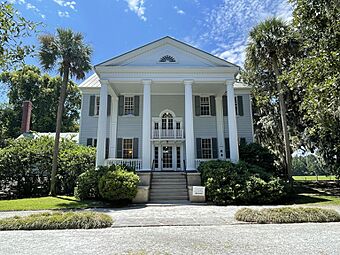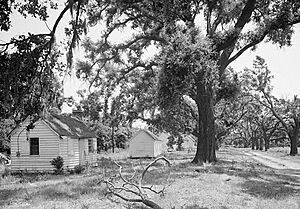McLeod Plantation facts for kids
Quick facts for kids |
|
|
McLeod Plantation
|
|

McLeod Plantation in 2022
|
|
| Location | 325 Country Club Dr., Charleston, South Carolina |
|---|---|
| Nearest city | Charleston, South Carolina |
| Area | 9.2 acres (3.7 ha) |
| Built | 1854 |
| Architectural style | Georgian |
| NRHP reference No. | 74001831 |
| Added to NRHP | August 13, 1974 |
McLeod Plantation is a historic site on James Island, South Carolina. In the past, it was a plantation, a large farm where enslaved people were forced to work. Today, it is preserved as an important place to learn about the history and culture of both African Americans and European Americans.
The site is especially important for understanding the Gullah culture. The Gullah people are descendants of enslaved Africans who were brought to the coastal areas of the American South. They created a unique culture and language that has survived for centuries.
Contents
History of the Plantation
The land where the plantation sits was first shown on maps in 1678, where it was called "Morris." The history of this place spans several important periods in American history.
From the American Revolution to the Civil War
During the American War of Independence in 1780, a British general named Sir Henry Clinton used the first house on this land as his headquarters. He was planning his attack on the city of Charleston. Many enslaved people at the time escaped to join the British army, who promised them freedom.
The main house that you can see today was built around 1858. It was designed in the Georgian style. Besides the main house, there are other historic buildings on the property. These include:
- Six small wooden cabins where enslaved people lived.
- A separate kitchen and a dairy building.
- A cotton gin house, built before the Civil War, used for processing a special type of cotton called long-staple cotton.
- A barn and a carriage house.
The Civil War and a New Beginning
During the Civil War (1861-1865), soldiers from the Confederate Army used the plantation. The main house was turned into a hospital for wounded soldiers.
In 1865, near the end of the war, the Confederate soldiers left Charleston. The plantation was then taken over by the 55th Massachusetts Volunteer Regiment, a unit of African American soldiers fighting for the United States.
After the war, the main house was used as an office for the Freedmen's Bureau. This was a government agency created to help newly freed African Americans. For a time, many formerly enslaved people lived on the plantation grounds as they started their new lives in freedom.
Changes in the 20th Century
In 1926, the owners at the time renovated the main house. The McLeod family lived in the house until 1990.
In 1993, a special project began on the land. Ten acres were set aside to grow sweetgrass. Sweetgrass is a key material used to make beautiful, hand-woven sweetgrass baskets, which are a famous tradition of the Gullah people. This project helped make sure there was enough grass for the basket makers.
McLeod Plantation as a Historic Site
In 2011, the Charleston County Park and Recreation Commission bought the plantation. This ensured that the historic site would be protected and open to everyone. The McLeod Plantation Historic Site officially opened to the public on April 25, 2015.
Today, the site is part of the Gullah/Geechee Cultural Heritage Corridor. This is a special area along the coast from North Carolina to Florida that recognizes the history and culture of the Gullah Geechee people. Enslaved people from many different parts of West and Central Africa were brought to this region. They were forced to work on plantations that grew rice, indigo, and cotton. From their diverse backgrounds, they formed the new Gullah Geechee culture and language, which blended many African traditions.
McLeod Plantation is also recognized as one of the most important African American Historic Places in South Carolina. It serves as a place to learn about the difficult history of slavery and to honor the people who lived, worked, and resisted here.
 | Janet Taylor Pickett |
 | Synthia Saint James |
 | Howardena Pindell |
 | Faith Ringgold |


